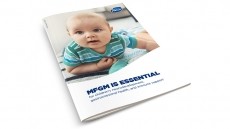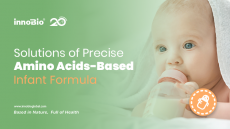Tiny Health increases funding, broadens clinical outreach

Unlike B2C companies such as 23andMe, Tiny Health wants to go beyond a direct-to-consumer approach to fold in a B2B model as part of its operations.
Speaking with NutraIngredients-USA, Tiny Health Founder Cheryl Sew Hoy said the company plans to train pediatricians, OB/GYNs and functional doctors, among others, helping them to interpret the results of Tiny Health microbiome tests so that professionals can relay that information to patients.
“We received so much demand from doctors and practitioners that we had to start a whole division supporting them,” she added. “We want to help their patients because we've seen in early life such fundamental shifts in the infant and the child with chronic conditions. One day we'll be in hospital systems, but our recent round of funding is really to help us turbocharge a B2B platform for clinicians.”
The company, which entered the market in April 2022, closed its Series A funding in March and has now raised a total of $13 million.
Monitoring evolving microbiomes
Tiny Health primarily offers parents the ability to understand and sometimes modify or shift the microbiome of their infants, such as rebalancing the gut to address eczema.
Consumers use the company’s microbiome tests to determine whether their child carries bacteria that protects them. Tiny Health says that when these are missing, infants often have colic, fussiness, gas and sleep issues. The tests identify additional biomarkers for allergies and asthma, as well as what microbes the mother has transferred to the baby during birth.
Tiny Health also provides testing to support a family's health from before pregnancy through infancy, childhood and adulthood, as well as during C-section recovery and for fertility through the optimization of vaginal health.
For example, the company has partnered with researchers to better understand how the endometrial and vaginal microbiome may impact in vitro fertilization (IVF). The vaginal microbiome of a healthy premenopausal person is dominated by Lactobacillus bacteria, which is associated with low vaginal pH and protects against unwanted organisms. Having a healthy vaginal microbiome, dominated by Lactobacillus, is critical for those trying to conceive or undergo IVF.
“If you don't have a healthy vaginal microbiome, you also have a higher risk of preterm labor,” Sew Hoy said. “If someone ever wants a kid and is trying to conceive, I highly recommended a gut and vaginal test, because, as adults, it take us a longer time to course correct our vaginal and gut microbes. It may take three to six months. If you're pregnant, you have a time window, right? It's hard to sometimes course correct during that time. As a company we want to work upstream to get more and more people aware preconception.”
Advanced technology and research
Tiny Health’s success is dependent on using advanced sequencing technology to get a full picture of customers’ microbiomes, Sew Hoy said. However, it does not use standard PCR (Polymerase Chain Reaction) tests, exams many people are familiar with as they are used to detect Covid-19. Instead, the company employs shotgun sequencing, a laboratory technique for determining a DNA sequence of an organism’s genome.
“PCR is what conventional doctors now use for stool testing,” Sew Hoy said, adding that it often only identifies specific strains and serves as a limited technology. “Shotgun is a new technology that uses the latest and greatest microbiome research because it tells you everything in your gut…all the bacteria, all the fungi, parasites, viruses, all the microbes in your gut. You get a full picture.”
Earlier this year, the company also completed an IRB-approved clinical study focused on C-section babies and will soon launch a next clinical study in partnership with the University of California San Francisco. Sew Hoy noted that as a result of its ongoing scientific research, Tiny Health has amassed a wealth of intellectual property.
“I'm not afraid of anyone catching up to the amount of data we have,” she said.















